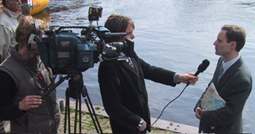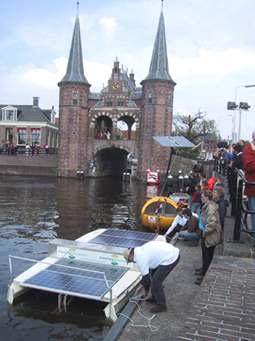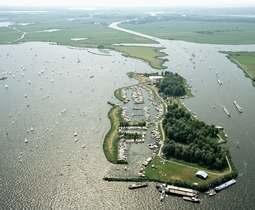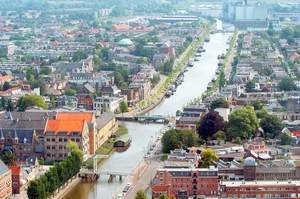|
Registration
for world's biggest solar powered boat race opens

Registration
for the Frisian Nuon Solar Challenge has opened. The world's biggest
solar powered boat race is being held from 26 June to 1 July 2006 in
the Netherlands. The Frisian Nuon Solar Challenge invites the business
community and students from all over the world to complete the
six stages of the racecourse as fast as possible in a self-built boat.
The only fuel they are allowed to use is solar energy. If you think
you are up to the challenge, sign up with your fellow-students as soon
as possible. There
is a limit to the number of available starting positions.
The
Frisian Nuon Solar Challenge combines the development of sustainable
energy with the route of the famous Frisian Eleven Cities ice skating
race. All eleven cities in water-rich Friesland are connected together
via rivers, lakes, canals and waterways. At this part of the site you
will find background information about the significance of the eleven
cities race, sustainable energy and Friesland as a water sports
region. Information is also given about the board of Stichting
Sinneboatrace Fryslân, which is organising the solar-powered boat
race.
The
Queen's Commissioner for Friesland, Ed Nijpels, gave the official
green light to register for the Frisian Nuon Solar Challenge, the
world's biggest solar-powered boat race, on Friday 13 May in Sneek.
The Frisian Nuon Solar Challenge is being held from 26 June to 1 July
2006. A maximum of fifty self-built solar-powered boats will be
completing the route of the famous Frisian Eleven Cities race as
quickly as possible in six stages.
A taste of what's in store was given on 13 May in Sneek. Five
solar-powered boats competed at the foot of the historic Waterpoort in
a demonstration race. The winner was the fast boat of the student team
of Delft University of Technology (TU Delft). Prior to the race the
organizers of the Frisian Nuon Solar Challenge announced at a press
conference that power company Nuon has agreed to be the event's main
sponsor. Other important sponsors include the Province of Fryslân and
the companies The Sun Factory and Sharp, which are providing the
competitors with the solar panels. During the next few months hundreds
of specialized companies and educational institutes all over the world
will be invited to take part in the Frisian Nuon Solar Challenge. The
competitors will complete the 220 kilometre route in boats they have
designed themselves and which are propelled exclusively by solar
power. The teams will be spending the nights at the locations of the
course stages along the route. The arrival of the solar-powered boat
fleet at each stage location will be celebrated with various
festivities.

The
event will start on 26 June 2006 in the Frisian capital of Leeuwarden
where the race will also finish on 1 July. Over those six days, the
entrants will cover 220 km following the traditional route of the
skating 11-city race as far as possible. Here you will find
information about the competition and the organisation of the Frisian
Nuon Solar Challenge, such as the route showing the obstacles, the
official regulations and the registration procedure. The competition
is open to teams of universities and specialised companies. A team of
experts will monitor the construction of the solar-powered boats and
ultimate decide whether the teams can actually take part in the race.
Given under 'Registration' is how the entrants can earn the start
ticket.

What
can you expect if you turn up at the starting line in a self-built
boat in 2006? One thing is for sure: the 220 kilometre race will drive
the competitors to the utmost limits of their endurance. The route
follows the course of the famous Frisian Eleven Cities race over
rivers, canals and lakes. Many obstacles and bottlenecks have to be
overcome along the way.
After
each stage of the race the competitors will be able to stay the night
at a specially laid out camping site in the town of arrival. The
arrival of the Frisian Nuon Solar Challenge fleet at each stage's
finishing line will be celebrated in the evenings with various
festivities.
The
Frisian Nuon Solar Challenge is still a year away, and that seems like
a long time. But the organisers want to give the competitors plenty of
time to build the best possible boat. The idea is for educational
institutes to include the building of the solar powered boat in their
study programme for 2005-2006. All competitors can call on the
assistance of Professor Wubbo J.
Ockels
and his team at Delft University of Technology (TU Delft).
A student team of TU Delft led by Wubbo Ockels won the World
Solar Challenge 2003 in Australia with Nuna 2, the world's fastest
solar powered racing car.
In
just under a year Wubbo Ockels will decide which boats are to be
admitted to the Frisian Nuon Solar Challenge. The organisers will
together with the sponsors Sharp and The Sun Factory then provide the
competing teams with the solar panels, free of charge.
If
this has inspired your educational institute to rise to the challenge,
lose no time in completing the registration form (see .pdf link below) and
sending it to Frisian Nuon Solar Challenge, P.O. Box 2567, 8901 AB
Leeuwarden, the Netherlands. You
can also fax the form the organisers.
 Application
Form
Application
Form
CONTACTS:
Frisian Nuon Solar Challenge
Postbus/P.O.Box 2567
8901 AB Leeuwarden
The Netherlands
T: (+31) 58 2137888
F: (+31) 58 2131723
E: info@frisiannuonsolarchallenge.com
www.frisiannuonsolarchallenge.com

REGULATIONS
The race is open to three classes of vessel:
A. one-person vessels
B. two-person vessels
C. open class.
The following requirements apply to class A:
Maximum length: 6 metres. Maximum width: 2.4 metres. Maximum height
above the waterline is 1.5 metres. Maximum weight excluding crew and
solar panels but including batteries and the securing structure for
the solar panels: 100 kg.
The following requirements apply to class B:
Maximum length: 8 metres. Maximum width: 2.6 metres. Maximum height
above the waterline is 2.0 metres. Maximum weight excluding crew and
solar panels but including batteries and the securing structure for
the solar panels: 150 kg.
The following requirements have been set for the Open Class:
Maximum length: 8 metres. Maximum width: 2.6 metres. Maximum height
above the waterline: 2.0 metres. The maximum weight for vessels in the
open class is not prescribed.
A maximum draft of 80 centimetres applies to all vessels.
The only source of power for the vessels are solar panels. Use of wind
power or energy generated by man or animal is not permitted. The
installed capacity of the solar panels for a single-handed vessel must
not exceed 750 watts peak output. The peak output for a two-handed
vessel must not exceed 1000 watts. The output will be ascertained
using a comparison with a calibrated solar panel.
Entry to the race is open to teams comprising at least 4 people. All
team members may act alternately as skipper or crew. However a skipper
must be at least 14 years of age. Skippers and crew shall be deemed to
have a minimum weight of 70kg during the race. Skippers and crew will
be weighed. Before the competition begins, the team must take part in
a qualification test. The test is intended to assess the operational
suitability of the vessels. The results will be used to evaluate
safety, manoeuvrability, control and the qualification time. A special
course must be sailed.
The team will have access to the vessels from 07.00 in the morning on
competition days. A briefing will be organised at 08.00 at which at
least one team member must be present. The vessels may be moved from
the harbour or dock to the start line from 08.30. The start time will
be 09.00. The starting order on the first day of the race will be
based on the qualification results. On subsequent days, the starting
order will be based on the finishing places of the previous day. The
start will be at 1-minute intervals.
LINKS:
Information on sustainable energy:
www.energyvalley.nl
www.duurzame-energie.pagina.nl
www.ecn.nl/_files/zon/psp00068.pdf
Information on the Province of Friesland:
www.fryslan.nl
www.beleeffriesland.nl
www.watersport-friesland.nl
www.boot-holland.nl
Information on other solar events:
www.wsc.org.au
www.solarsplash.com
www.americansolarchallenge.com
www.nuna3.com
www.duurzaamzeeland.nl
www.zonnebootrace.nl
|